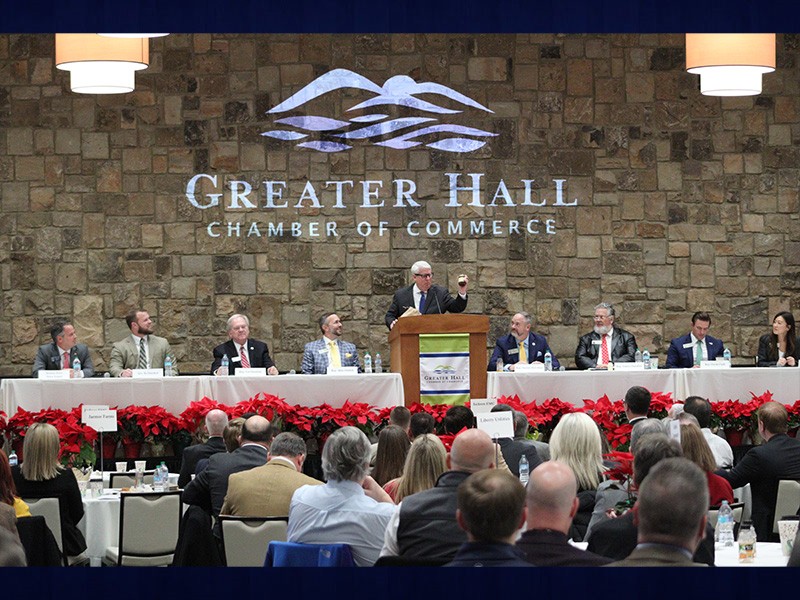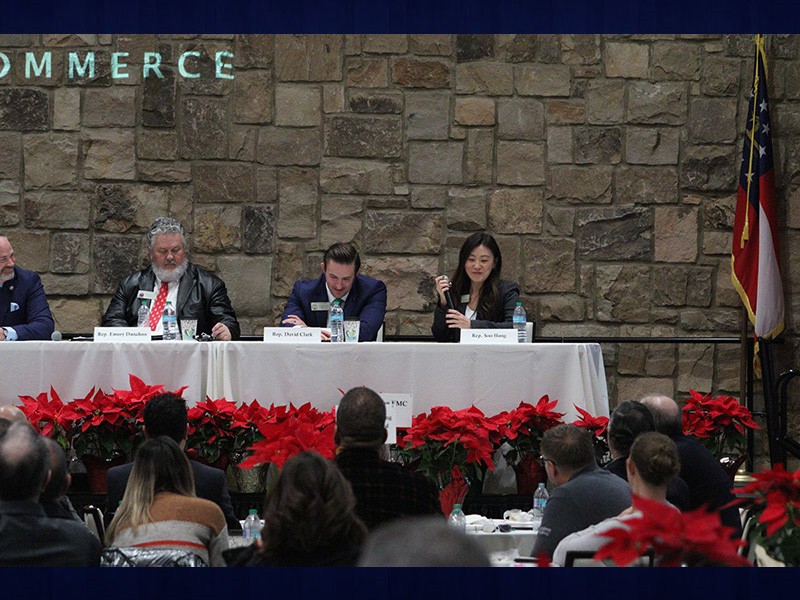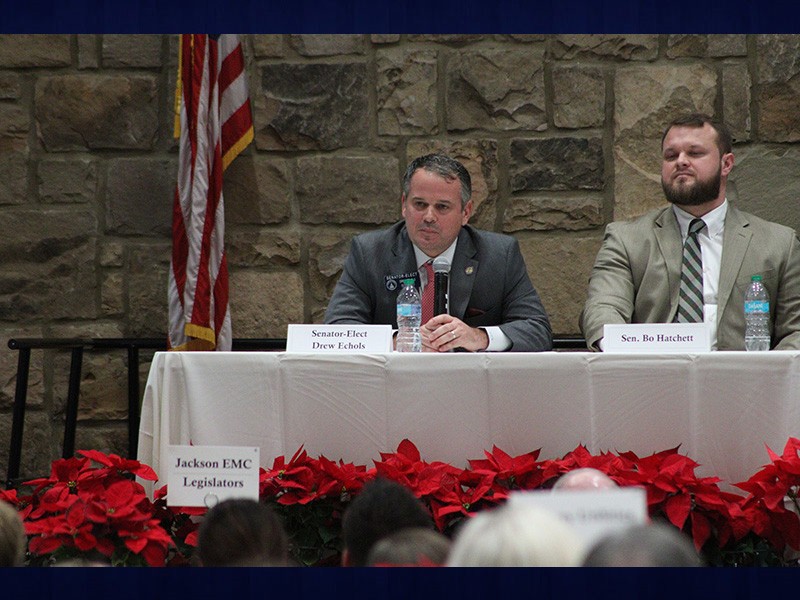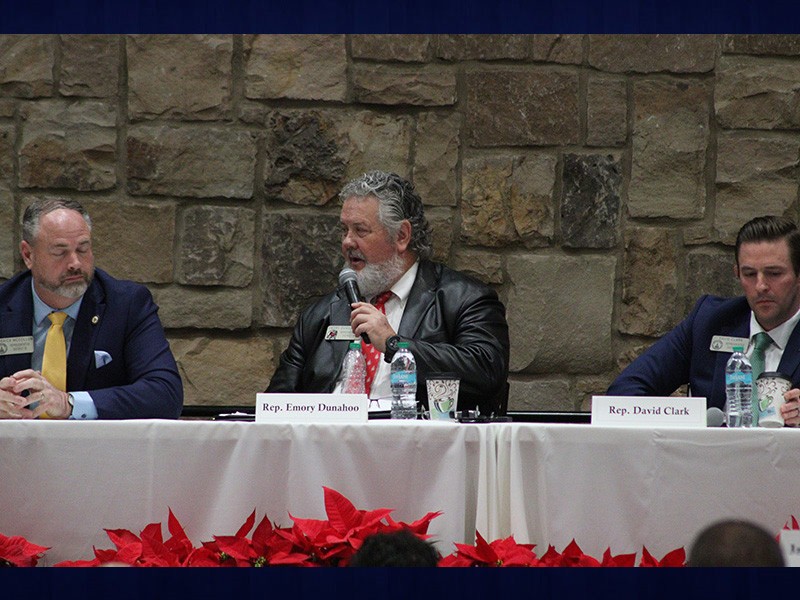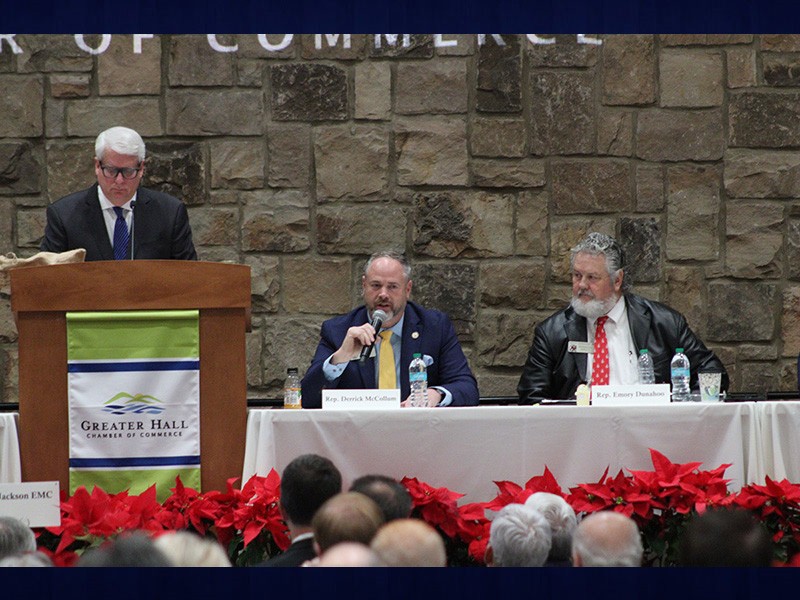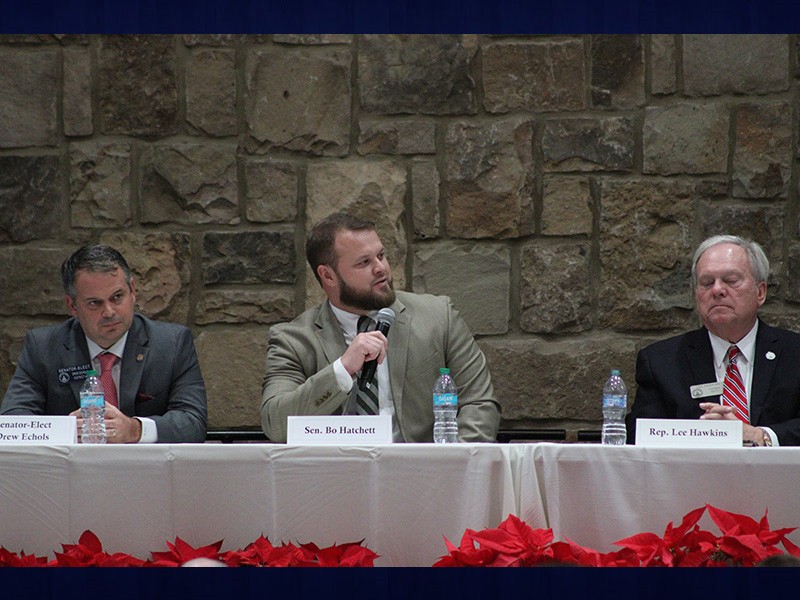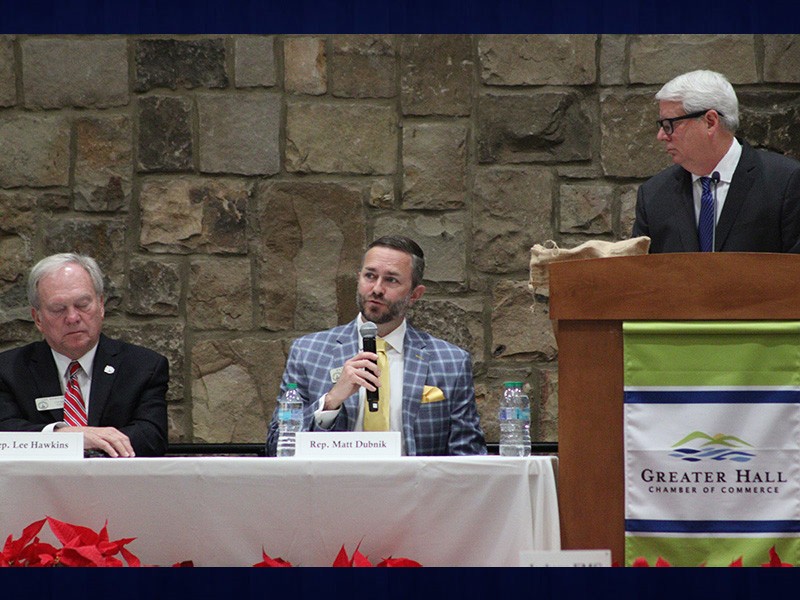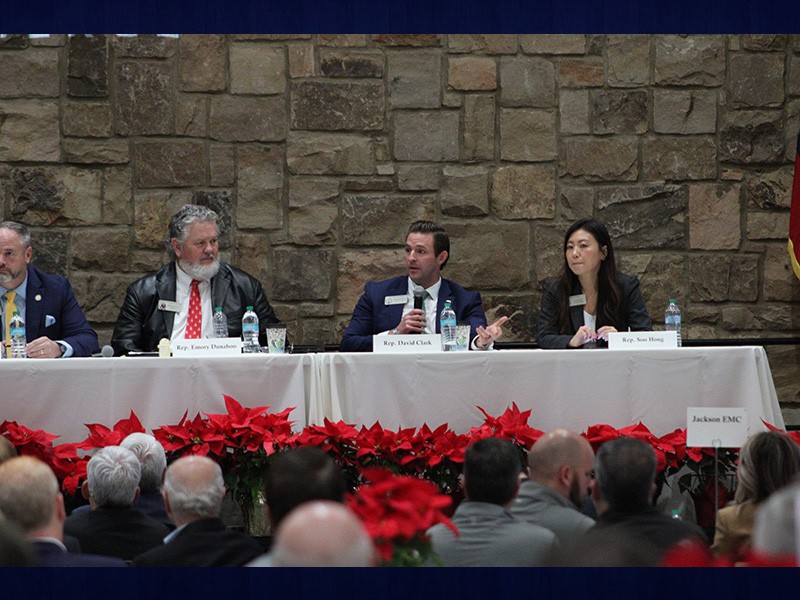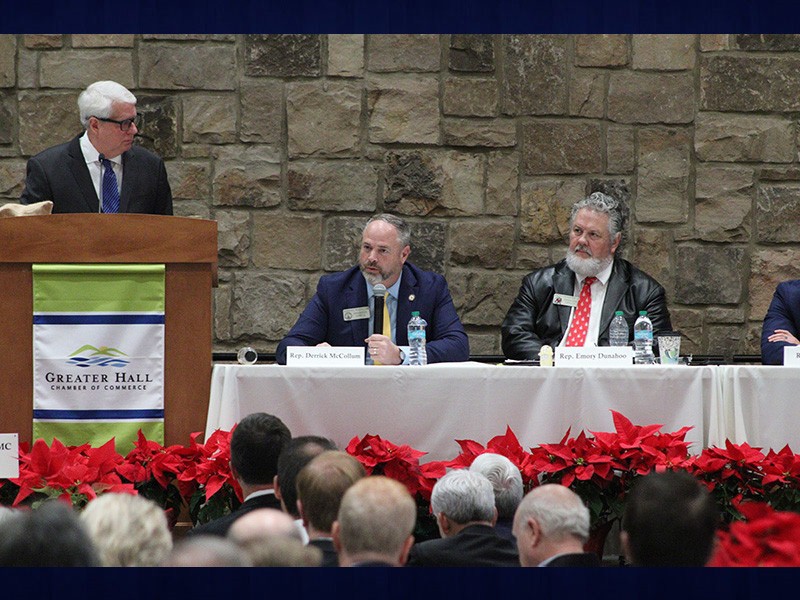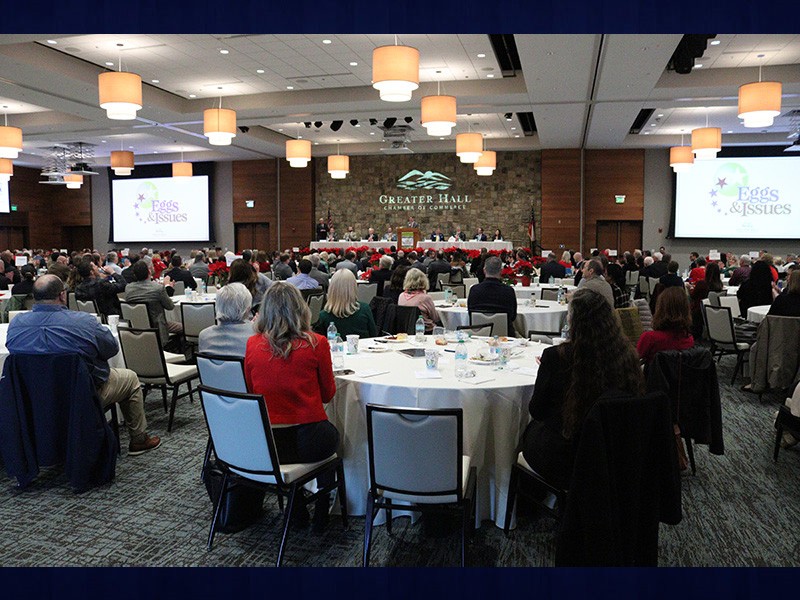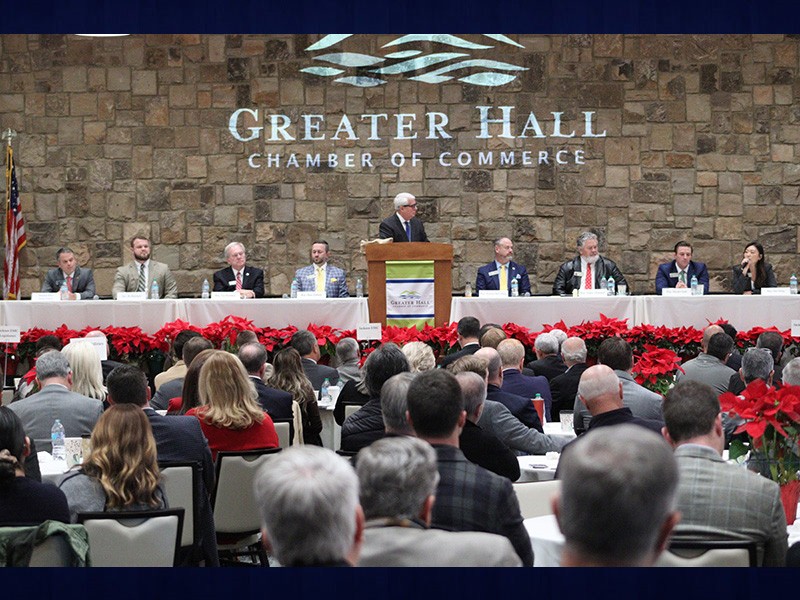The Greater Hall Chamber of Commerce held its annual Eggs and Issues event at the Ramsey Conference Center at Lanier Technical College on Thursday.
The event showcased state legislators representing Hall County answering questions from community stakeholders over the course of a two-hour breakfast, mingling, and questioning session.
The event kicked off at 7:30 a.m. and saw over 500 people in attendance from local groups like the Georgia Mountain Food Bank, Habitat for Humanity, Candler Development Services, Lanier Islands, and many more.
After attendees grabbed their plates supplied by Longstreet Cafe and people went all across the conference room to have a quick chat, questions began at around 8:30 a.m.
Local businessman Doug Carter moderated for the eight representatives in attendance including State Senator-Elect for district 49 Drew Echols and State Senator for district 50 Bo Hatchett.
It also featured State Representatives for district 27 Lee Hawkins, district 29’s Matt Dubnik, district 30’s Derrick McCollum, district 31’s Emory Dunahoo, Jr., district 100’s David Clark, and district 103’s Soo Hong.
Health
The first question centered around health, specifically Governor Brian Kemp’s prioritization of liability reform in the next legislative session that begins on Jan. 13.
“We’re reviewing all of the information to come up with a solution that is good to not only protect our businesses … but also making sure that those that are hurt, those that are liable, are held liable and those that are hurt are compensated,” Hong said.
Mental Health and School Safety
Next, Carter moved on to mental health and how it relates to school safety, pointing the question toward Dubnik.
“We do have to tackle that from a financial standpoint, but we do have to also find a way to find more practicing clinicians who can help inside,” Dubnik said.
Hatchett said that while the financial investment is a good start, money can not solve all of the issues.
“$300-million towards school safety, and while that’s a great start … I don’t think money is going to solve the problem,” Hatchett said. “While it does start at the door of the school, it also starts at home.”
Workforce Development
The next question was about workforce development initiatives directed toward Hatchett.
“Now, the way the workforce is changing in Georgia, I think technical college is going to be the biggest catapult for us into the future,” Hatchett said.
Hong attributed some of the issue is losing skilled jobs as younger generations come up.
“A lot of what we hear is that a lot of the younger generation are not doing certain jobs anymore,” Hong said. “That’s why we are investing so heavily in technical colleges, because those jobs and those skills, we’re losing them.”
Dunahoo, Jr. said that we need to incentivize people who are already here.
“A product coming from China comes here 30-percent less than what we can start the manufacturing process here in Georgia,” Dunahoo, Jr. said. “A lot of the ones that have been here for 50 and 100 years, we’re not doing anything for them.”
Energy
Carter then asked the panel if they prefer Jackson EMC or Georgia Power, which was replied with laughter from the crowd. The reason he asked was due to the fact that Georgia being such a good place to do business can be attributed to our energy.
“If you look at private equity groups, they buy up a lot of these power companies and they run the rate very high,” McCollum said. “We want to just make sure that they have the resources they need to continue building generation plants in Georgia.”
Clark spoke about expanding all energy sources.
“We need to be looking at a lot of different options, not closing coal plants but expanding,” Clark said. “Then nuclear is a very clean energy … so I think we need to really be broad and open.”
Transportation
With TSPLOST failing in Hall County, the focus shifted to transportation.
“I’m hoping we’re gonna push for more funding in Georgia for transportation options, that’s a huge issue especially here in north Georgia,” McCollum said.
Echols said that the state will continue trying to fund projects, including the Spouts Springs widening.
“The state of Georgia ponied up an extra $1.5-billion last year for transportation,” Echols said. “That’s a big number, but look forward to it again this year.”
Affordable Housing
Affordable housing was the next issue for the representatives, with McCollum saying that private equity groups need to stop buying up properties.
“The middle class is under attack because private equity groups are buying up all the single-family housing,” McCollum said. “So our younger generation, my kids, my grandkids are not going to be able to compete with private equity groups.”
McCollum said he is working on legislation to address that issue and that a potential solution could be taking some homes off the market.
“Government can’t always be the answer, and sometimes that means we need to get out of the way and let business take over,” Dubnik said. “If we’re going to incentivize, then it may be let private industry and private business figure this out and go out and continue to build that housing.”
Hatchett said that farmland is disappearing, so the state needs to be careful with incentives it gives or else the agricultural community will disappear.
Disaster Relief
Carter then asked Echols about disaster relief in light of the recent hurricane.
“Our leadership’s made it a priority that basically day one, we’re going to start working on this, and I look forward to that,” Echols said. “I’m convinced a lot of those communities, they’re not coming back, and I would hate to see that happen to rural Georgia.”
Referendums
Carter then asked about various referendums to every legislator on the panel. Those included legalizing marijuana, legalizing sports betting, and pro-life legislation.
Hatchett, Hong, and Clark were not in favor of referendums, but in passing legislation surrounding these issues.
McCollum and Dubnik were in favor of legalizing marijuana for recreational use.
Hawkins and Dunahoo, Jr. opposed legalizing marijuana.
Dunahoo, Jr. said he would listen to a debate on sports betting. Dubnik said he is in favor of sports betting, but not casinos while Hawkins said he is in favor of sports betting.
McCollum said he is not in favor of sports betting.
All of the legislators that agreed with a referendum on the different issues were pro-life.
Echols said he does not smoke pot, doesn’t gamble, and is “as pro-life as you’re gonna find.”
Most Important Issue
The last thing was the most important issue for each representative in one to three words.
Echols: Hurricane relief and workforce development
Hatchett: School safety, transportation, and deportation of undocumented criminals
Hawkins: Health care
Dubnik: Funding for mental health initiatives
McCollum: Downsizing government and “cutting red tape”
Dunahoo, Jr.: Agreed with Hatchett, also added that we need to build infrastructure before we continue to sell it and protect the unborn.
Clark: Education
Hong: Liability and tort reform
The event sponsored by Jackson EMC, Milton Martin Honda, Lanier Tech, Lowes, and Gainesville Coca-Cola bottling concluded, with people sticking around at their tables to talk to their representatives before filing out.
Now, the legislators will head to Atlanta to begin their legislative session on Jan. 13.


